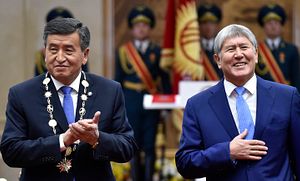On November 24, Kyrgyzstan’s new president, Sooronbai Jeenbekov, was inaugurated at the Ala-Archa presidential residence in Bishkek. The 59-year-old former prime minister arrives in the presidency on the heels of his Social Democratic Party (SDPK) compatriot Almazbek Atambayev.
The transfer of power marks a milestone in Kyrgyzstan’s political development. It is the first normal transfer of power between two elected individual in the country’s 26-year history. It is the first power transfer of its kind in independent Central Asian history. Every other transfer of power in the region was prompted by either the death of a president (in the cases of Turkmenistan in 2006 and Uzbekistan in 2016) or popular revolt (Kyrgyzstan in both 2005 and 2010).
Momentous as it is, Jeenbekov’s entry into the presidency is not without political baggage.
First, while international observers like the OSCE judged the election as competitive and transparent, they also noted “numerous and significant procedural problems” during vote counting. Furthermore, the OSCE mentioned issues such as “misuse of public resources,” “vote-buying,” and “reports of undue restrictions on media freedom.”
The OSCE’s preliminary report, published shortly after the October 15 election, also did not not factor in the news broken by Kloop.kg that Jeenbekov’s campaign had access to a voter database hosted on the government server.
Second, Atambayev’s politicking in favor of Jeenbekov has set his successor up for a difficult first few months. Atambayev, rather than talking up Jeenbekov’s qualities, spent much of the one-month campaign smearing Jeenbekov’s main rival, Omurbek Babanov. This mudslinging has had two lines of impact, first on Babanov (with implications for Kyrgyz politics more broadly) and second on the Kazakh-Kyrgyz relationship.
Despite calmly conceding the election, Babanov has since landed in what could develop into significant trouble. Earlier this month, state prosecutors opened a criminal case against Babanov related to a campaign speech. Officials, as Eurasianet noted, “are accusing Babanov of fomenting ethnic tension and attempting to incite the overthrow of the government during a campaign stump speech in a largely Uzbek community in the southern city of Osh.” He subsequently stepped down from leadership of the Respublika-Ata-Jurt parliamentary faction.
Tension between ethnic Uzbeks and Kyrgyz remain a political third-rail in Kyrgyzstan, with discussions of the 2010 violence in the country’s south continuing to stir the nationalist hornet’s nest. Babanov’s team said videos of his Osh speech were doctored to take his comments out of context and portray him as sympathetic to the Uzbek minority over the state.
The pursuit of criminal charges against Babanov in relation to his Osh speech is further testament to the Kyrgyz polity’s inability to address the lingering scars of the 2010 violence.
Jeenbekov is further set up for a difficult start regarding one of Kyrgyzstan’s most important relationships: with Kazakhstan. Atambayev’s mouth is the root cause of the present tension on the Kazakh-Kyrgyz border best seen in long lines of trucks waiting to cross through increased Kazakh customs checks. (I’ve delved into this issue multiple times already, so for an explanation read this).
Jeenbekov takes over the Kyrgyz presidency at an interesting and vital time. The Kazakh border may be a new problem but at least one old problem is moving ever closer to a solution: the Uzbekistan-Kyrgyzstan relationship is experiencing a renaissance.
In his remarks at the inauguration, Jeenbekov promised to protect the “unity of the country.” He made strong comments about combatting corruption and this nugget of wisdom regarding democracy: “Democracy has two friends: the first — freedom, the second — responsibility. I will spare neither the strength nor the time to fulfill my duties to the people.”

































